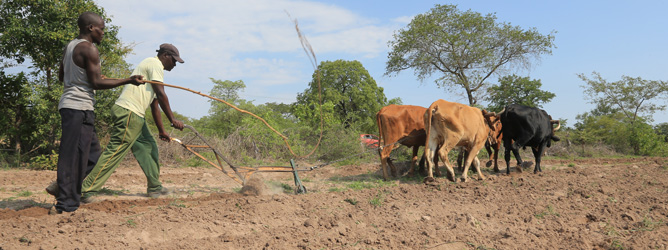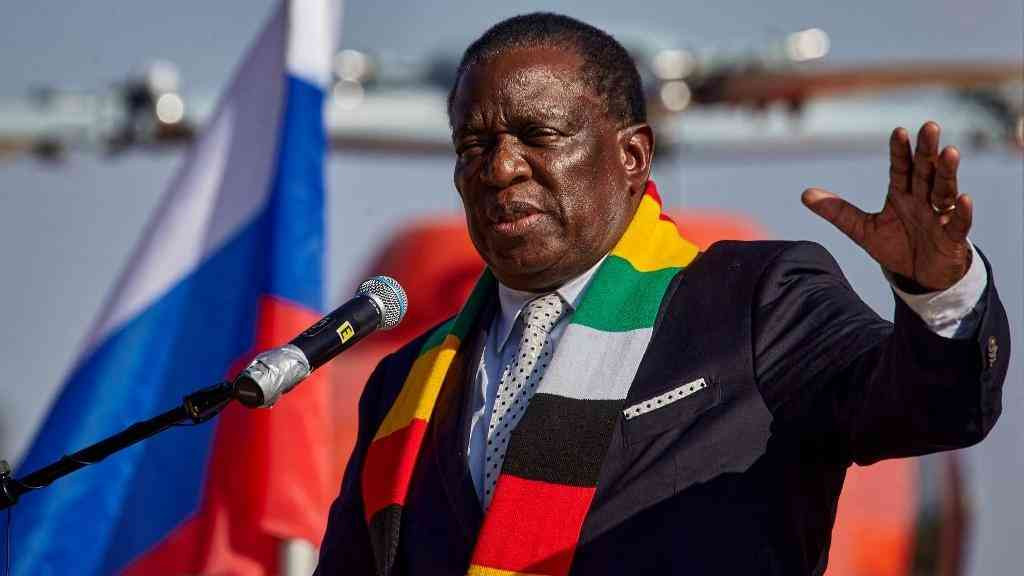
It is 10 o’clock on a Wednesday morning and temperatures are already soaring above 38°C in Masvingo Province, Mwenezi district. The sky is crystal clear; there is no sign of rains.
Everson Mushava
Covered in a cloud of dust, a sweating William Machingo (58) is weeding in a neighbour’s dry fields in Chibaya Village so that he can get mealie-meal to prepare sadza for his old and ailing mother and three children.

Machingo, who walks with a limp due to a leg injury sustained during the liberation war in 1979, looks distraught and hopeless.
“We are sleeping on empty stomachs. We had a poor harvest last year. Our food stocks have run out, and there is no hope in sight,” Muchingo said, his wrinkled face visibly showing the effects of starvation.
Muchingo said, like most needy families in the drought-stricken-district, he was surviving on hand-outs from non-governmental organisations such as Care International, but has to supplement what he gets through “piece jobs.”
“Care gives us six kilogrammes of sorghum per head, two kilogrammes of beans and one bottle of cooking oil every month, but it is not enough,” Muchingo said.
- Chamisa under fire over US$120K donation
- Mavhunga puts DeMbare into Chibuku quarterfinals
- Pension funds bet on Cabora Bassa oilfields
- Councils defy govt fire tender directive
Keep Reading
Mwenezi district lies in climatic region 5, which is characterised by law rainfall. Zimbabwe recorded a poor harvest during the 2014/15 farming season due to low rainfall, but climate experts have warned that this year could be worse as the country bears the brunt of “a record breaking” El Niño phenomenon.
El Niño is the warming up of the equatorial Pacific Ocean, resulting in extreme weather conditions across the world.
Weather experts have warmed that the phenomenon that began last year could be the strongest on record, leading to extremely low rainfall and high temperatures in most parts of the country.
Zimbabwe experienced one of its worst El Niño events in 1997/98 which saw significantly reduced crop yields and the death of thousands of livestock.
Most parts of Zimbabwe are yet to receive meaningful rainfall just a few days before the planting season comes to an end, and villagers who had planted early have been forced to replant as a prolonged dry spell has seen most of the crops wilting.
Mwenezi only received its first rainfall on January 26, according to Muchingo, and a serious food crisis looms.
“I have never seen such a drought. I didn’t see the 1947 drought, but I think this one is the worst ever to confront us,” added Muchingo.
He said government should make urgent moves to ensure that food relief is provided in hunger-stricken provinces instead of leaving all the burden to humanitarian organisations.
Even relish was now a problem, he said, with some people forced to eat tree worms, popularly known as zvidhongoti in Shona.
Amion Zezayi (67) of Mativenga Village in Mwenezi, said he has 11 dependents, most of them his orphaned grandchildren.
“What we get from Care is not enough. We have to practise serious budgeting and this means reducing meals to a single meal a day,” Zezayi said, gazing at the clear sky.
“Care said it would stop aid in March; we don’t know what will befall us if that happens, taking into account that we are surely destined for a more vicious drought,” he said.
“We no longer have money to buy food. We used to sell cattle to buy food, but most of them succumbed to the drought in December before the rains. Some lost all their cattle.”
He said Mwenezi was experiencing the worst humanitarian crisis ever.
Sarah Ruhodhi (75) in Mwenezi’s Chityatya Village looks after her daughter and her three children.
She says although she appreciated the help from Care, most of the time she has to look for extra sources of food.
“Government is releasing money for the elderly erratically. I receive $50 but was last paid in December, and I have to look for money for school fees for my grandchildren apart from food,” Ruhodhi said.
Joseph Jeyamwa, who sells maize grain at Runde, Mwenezi, said government should intervene quickly to save lives as most villagers no longer had the money to buy food.
“When I started selling maize here in August last year, we could sell a whole tonne in a single day. Villagers were selling cattle to buy food, but around December, their cattle started dying due to the drought,” he said.
“Some cattle were being sold for as little as $30 per beast and goats at give-away prices.
“But now, people no longer have the means to buy food. If the situation continues, many will die.”
Mwenezi is not the only Masvingo district facing a ravaging drought.
Chivi, Bikita and Zaka are also in dire need of food aid. Most crops that had been planted in Chivi’s Mandamahwe have wilted due to lack of rains, and the case is the same in Bikita and Zaka.
“The situation is dire; people no longer have the money to buy food. Villagers are receiving a 50kg bag of maize from Plan International and $6 for every family member per month.
“It is not enough, and villagers have no money to supplement the supplies. Many families are going to bed on empty stomachs,” said Simbisai Mlambo, a general dealer at Mbuyanehanda Township in Bikita.
President Robert Mugabe last week declared 2016 a drought year after the country received below normal rains.
The declaration is expected to help attract international attention to Zimbabwe’s starving population.
The Zimbabwe Vulnerability Assessment Committee says an estimated 1,5 million rural locals will be food-insecure in the first three months of this year and the situation will worsen due to the current drought.
Chief Neshuro in Mwenezi, said government should immediately avail cheaper grain through the Grain Marketing Board to avert a humanitarian crisis.
“Even myself, I am not spared by the drought. It affected both human beings and livestock. Hungry cattle would die at a water source. The situation is bad,” Chief Neshuro said.
Acting Agriculture minister Saviour Kasukuwere last week said the number of Zimbabweans needing urgent food relief had risen to 2,4 million due to the drought.









